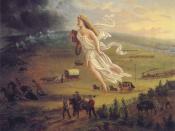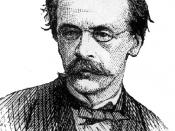The people of 19th century approvingly observed the expansionist spirit of America in the 1840's, and called it 'Manifest Destiny.' This phrase has been adopted by historians to characterize both the mood and the process of expansion. The people believed that it was the obvious fate of the American people to advance into and take possession of neighboring lands, in essence they said that the United States was preordained to control all of North America.
Like many other countries of the time the United States began to be strongly affected by a feeling of pride in their country, or a sense of 'nationalism.' Americans thought that their institutions and their ways were better than those of other countries; therefore, they had a right and even an obligation, if they were powerful enough, to impose their ways on less able or fortunate people, who would benefit from the experience.
With Americans this concept of supremacy also came with a conviction, deeply beheld by it's people, that the United States was to demonstrate to all the world the virtues and glory of Democracy.
Compared to many other developments of the Americas in the 1840's this belief 'fit like a glove.' The election of 1844 is a good example.
In a year a majority of the people obviously and unmistakably favored a program of expansion, many of the politicians, most of them in the Whig party, did not seem to sense the expansionist mood of the country. Henry Clay expected to be the Whig candidate, and Van Buren the Democratic nominee. Both wanted to avoid taking a stand on the annexation of Texas, because no matter where they stood it was certain to lose votes. They both issued similar statements, that said they opposed annexation without the consent of Mexico.


